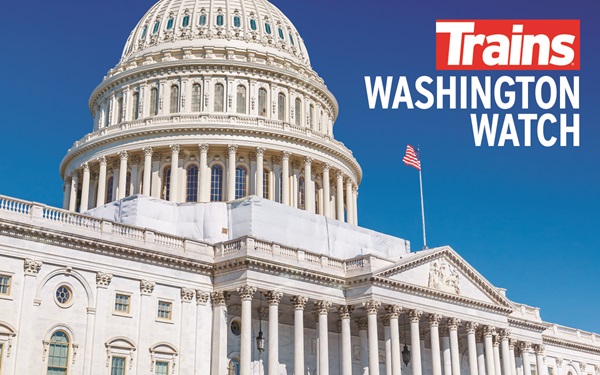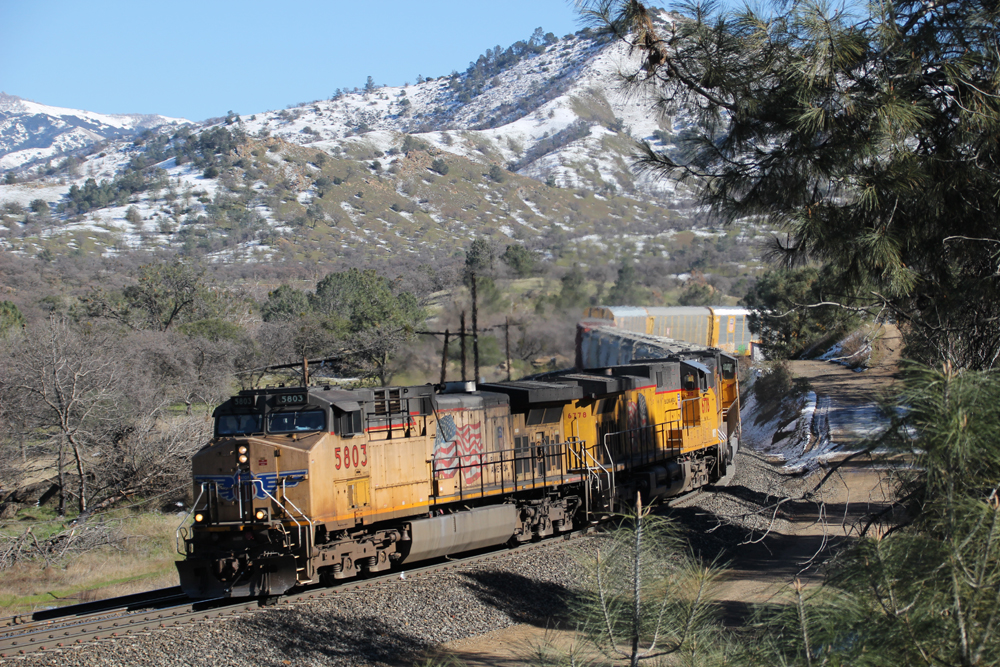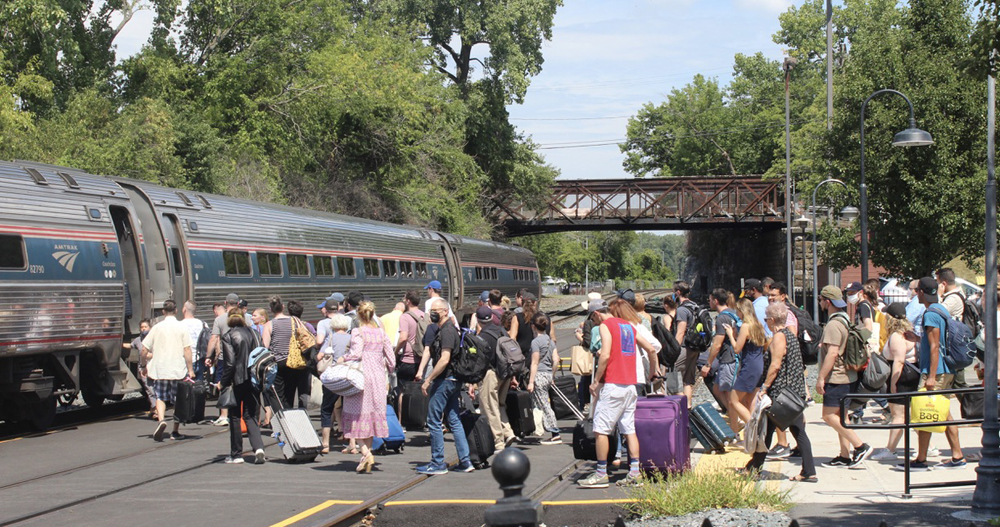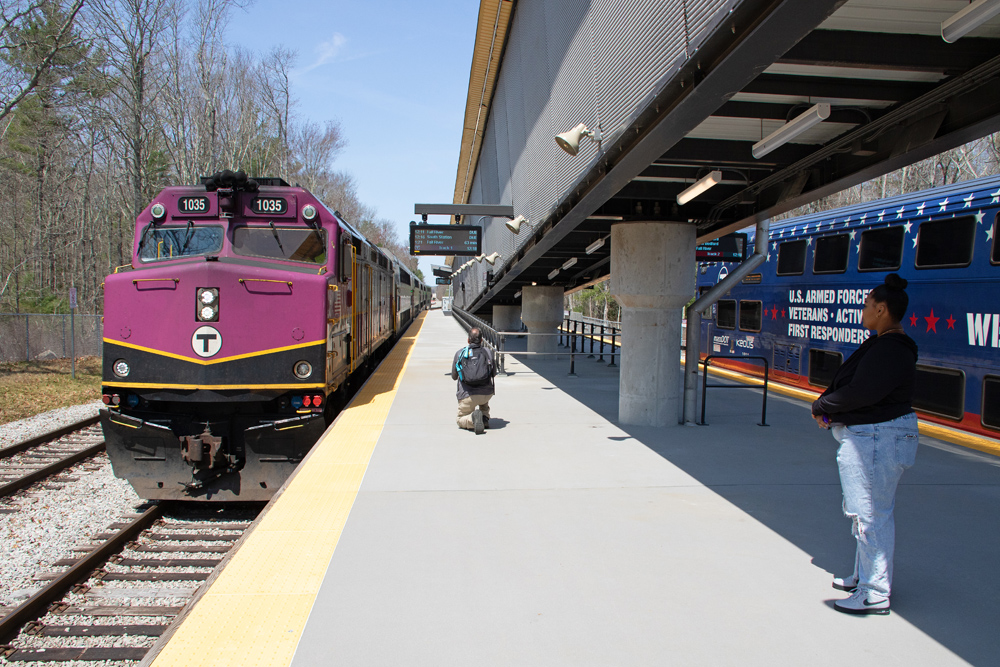
WASHINGTON — The House of Representatives will vote today (Wednesday, Nov. 30) on legislation to impose a settlement in the labor dispute between railroads and unions, House Speaker Nancy Pelosi said Tuesday.
The House will also consider a separate motion to add seven paid sick days to the tentative agreement reached in September between the two sides, a move decried by the Association of American Railroads and welcomed by unions.
The House votes will set in motion a process that could end the possibility of a national rail strike well ahead of the Dec. 9 deadline.
Pelosi’s promise of action came a day after Biden called for congressional action to prevent a strike [see “Biden calls on Congress …,” Trains News Wire, Nov. 29, 2022]. The New York Times reports that Biden met Tuesday morning with congressional leaders of both parties — Pelosi, House Minority Leader Kevin McCarthy (R-Calif.), Senate Majority Leader Chuck Schumer (D-N.Y.), and Senate Minority Leader Mitch McConnel (R-Ky) — telling them “the economy is at risk” without action. All four indicated a willingness to support the legislation.
“It is with great reluctance that we must now move to bypass the standard ratification process for the Tentative Agreement,” Pelosi wrote in her statement. “However, we must act to prevent a catastrophic strike that would touch the lives of nearly every family: erasing hundreds of thousands of jobs, including union jobs; keeping food and medicine off the shelves; and stopping small businesses from getting their goods to market.
“After hearing from our Members, we are in agreement that a nationwide rail strike must be prevented — and that more must be done to secure the paid sick leave that hard-working railroaders deserve.”
Therefore, she said, the House will first vote on adopting the tentative agreement announced Sept. 15, which includes a 24% pay increase over the five-year period between 2020 and 2024 [see “Freight railroad strike averted …,” Trains News Wire, Sept. 15, 2022]. That deal has been ratified by eight of 12 national unions but rejected by four others.
That will be followed by a separate up-or-down vote on adding the sick days, after which the package will be sent to the Senate.
CNN reports that the Senate could vote later this week or early next week, and that enough Republicans are likely to support the measure to break any filibuster on the bill. If he sick-days provision passes in the House, there is no guarantee the Senate would follow suit. Sen. Bernie Sanders (I-Vt.) did write on Twitter, however, that he would block any legislation until there was a roll-call vote on adding seven sick days.
If passed by the Senate, the legislation would then go to Biden for his signature, imposing the terms of the tentative agreement and make any walkout an illegal “wildcat” strike — which would allow railroads to replace workers who strike.
Amtrak CEO Stephen Gardner said in a statement that the passenger railroad welcomed the prospect of congressional action.
“We appreciate and support President Biden’s request for quick Congressional action to end the threat of a freight rail shutdown,” Gardner wrote. “A shutdown would affect Amtrak’s service across the nation, and we implore Congress to take action well before the December 9 deadline to minimize impacts to Amtrak service.”
The American Short Line and Regional Railroad Association also backs legislative action, saying a voluntary agreement would have been preferred, but since that is not likely “congressional intervention is now necessary,” according to ASLRRA President Chuck Baker.
“Any rail work stoppage or any further delay in getting a labor agreement completed helps no one: it would greatly exacerbate the ongoing supply chain challenges, increase uncertainty, and needlessly upend the U.S economy,” Baker said.
Meanwhile, a statement from the Association of American Railroads said the House move to add paid sick time measure would undermine future collective bargaining between unions and the railroads, while the Transportation Trades Department of the AFL-CIO said it would rectify a major oversight of the Presidential Emergency Board whose findings shaped the tentative agreement.
“President Biden spoke clearly on the appropriate need for Congress to implement the agreements already ratified by eight of the 12 unions, which represent a clear pattern,” AAR CEO Ian Jefferies said in a statement Tuesday. “Doing so was never anti-worker, in fact it would reward all rail workers with historic deals — particularly those who already ratified — as well as the millions of workers across the economy who would suffer from a rail strike.”
Calling the idea that rail workers do not get sick leave “a wholly false premise,” the AAR noted that members of every union already get some form of paid sick leave, the terms of which were negotiated between the railroads and each union. “These benefits are no accident — they are the result of decades of collective bargaining in which unions have repeatedly agreed that time off for shorter illnesses may be unpaid in favor of higher compensation and more generous long-term sickness benefits,” the AAR said.
“Now is not the time for Congress to put its thumb on the scale and selectively add to labor contracts, including agreements already ratified by employees, created through a multi-year process,” Jefferies said.
Rail workers have argued that they can be penalized under current attendance policies for taking a day off because of illness, and that the ability to time off for short-term illness is a safety matter: that their job requires a high level of concentration that they cannot meet if they are ill. The unions that have voted down the tentative agreement Congress will be asked to ratify have indicated they have done so because of concerns over working conditions, which were not addressed by the PEB.
“For more than three years, America’s rail unions bargained in good faith with freight railroads to improve hellish working conditions that pushed workers to the brink of exhaustion, illness, and burn out,” Greg Regan and Shari Semelberger, president and secretary-treasurer of the Transportation Trades Department, said in their statement. “… While the unions didn’t get everything their members wanted through the Presidential Emergency Board (PEB) process and subsequent negotiations, they secured some major wins for workers. Today, Congress has an opportunity to grant sick leave to rail workers, thus rectifying a major omission by the PEB. …
“We urge the House and the Senate to vote in favor of guaranteeing seven days of paid sick leave to rail workers. A worker should not be fired for going to the doctor. Yet it is 2022 and railroaders are fighting for sick leave in the richest country on Earth.”
Calling freight railroads “modern day robber barons,” the statement says “it is clear we need massive systemic reforms to the freight rail industry to improve the lives of rail workers and the service that is provided to freight rail customers.
“Transportation labor will aggressively pursue necessary reforms to the rail industry through legislative and regulatory action. Today, we can achieve paid sick leave for rail workers. Tomorrow, the fight continues.”
— Updated at 7:20 a.m. CST with statements from Amtrak and the Association of American Railroads. Further updated and revised at 9:30 a.m. CDT with statements from Transportation Trades Department of the AFL-CIO and the ASLRRA.














“If passed by the Senate, the legislation would then go to Biden for his signature, imposing the terms of the tentative agreement and make any walkout an illegal “wildcat” strike — which would allow railroads to replace workers who strike.”
Replace with who? It takes months to train new employees and the railroads are already short handed due to their past employment practices and decisions.
Exactly why I think a “wildcat,is possible.
“Imposing” is not what Congress is all about. This is wrong at so many levels. Even the threat to “impose rules” is not causing anyone to budge. Politicians only want to kick the can down the road until someone else can fix it so they can get re-elected.
For many years IBM was a major manufacturing company.
Never had a union.
Treated the people like “human beings.”
Unions arise in response to bad management, union problems arise in response to REALLY bad (usually dumb) management.
Treat employees like throw-away pieces, they start acting like throw-away pieces.
In the RR industry, the “us vs. them” is so embedded, they may never see a new day.
TIMOTHY — Best post yet!
This will never be solved by Congress or the Labor Department, but only by an agreement in good faith by the rail companies and labor.
Exactly like the company I worked at for 41 years, non union and still going strong after more than 100 years because management treated the workers with respect even when downsizing from 12000 to 5000 employees.
The direct competitor directly on the other side of the fence, over 18000 employees had an adversarial management/union relationship. Now a few hundred workers two owners later.
I have to fully agree with you Timothy after witnessing it first hand, treat your workers with respect and dignity they will be there for you every day.
p.s. downsizing due to technology while maintaining tonnage output.
If this decision is forced on the rail unions,I don’t think we should be surprised if we see a 24 hour “wildcat” or rail flu to protest this. There are a lot of bad feelings that have been festering for years,some sort of job action is bound to happen.
Maybe instead of legislating workers what really needs to be done is to legislate hours of work like they have done in other forms of transportation especially since the RR’s are still using draconian work rules developed a century ago and abused and pushed to the limit.
While they’re at it, why don’t they pass legislation to force the UAW to make more cars with fewer people at the Big 3, pass legislation to force truck drivers to deliver more goods by working longer hours with less drivers, etc etc….politicians have no business medaling in union/management issues. The railroad management is the problem here, not the workers.